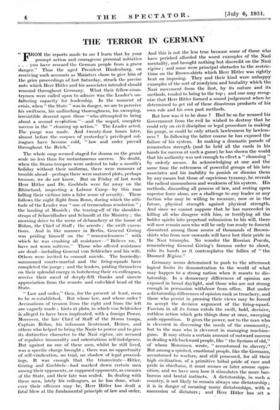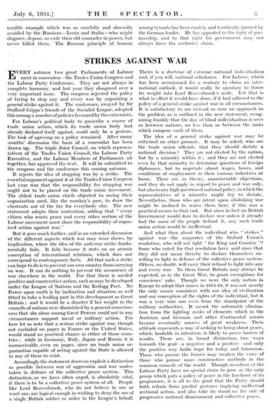THE TERROR IN GERMANY
FROM the reports made to me I learn that by your prompt action and courageous personal initiative . . . you have rescued the German_ people from a grave danger." Thus the aged President Hindenburg, on receiving such accounts as Ministers chose to give him of the grim proceedings of last Saturday, struck the precise note which Herr Hitler and his associates intended should resound throughout Germany. What their fellow-coun- trymen were called upon to admire was the Leader's un- faltering capacity for leadership. In the moment of crisis, when " the State " was in danger, we are to perceive his swiftness, his unflinching thoroughness, his swooping, irresistible descent upon those "who attempted to bring about a second revolution "—and the sequel, complete success in the " cleaning up action." The Leader acted. The purge was made. And twenty-four hours later, almost before the corpses of yesterday's privileged col- leagues have become cold, " law and order prevail throughout the Reich."
The whole coup seemed staged for drama on the grand scale no less than for instantaneous success. No doubt, when the Storm-troopers were ordered to take a month's holiday without their uniforms, there were rumours of trouble ahead—perhaps there were matured plots, perhaps treason, we do not know. But on Friday of last week Herr Hitler and Dr. Goebbels were far away on the Rhineland, inspecting a Labour Camp—by this ruse lulling their victims into a false sense of security. There follows the night flight from Bonn, during which the atti- tude of the Leader was " one of tremendous resolution " ; the landing at Munich ; the tearing-off of the shoulder- straps of Schneidhuber and Schmidt at the Ministry ; the morning drive to the scene of debauchery at the house of Rohm, the Chief of Staff ; the arrests ; the swift execu- tions. And in like manner in Berlin, General Goring was priding himself on the " remorselessness " with which he was crushing all resistance—" Believe me, I have not worn mittens." Those who offered resistance are dead—including General von Schleicher and his wife. Others were invited to commit suicide. The hurriedly- summoned courts-martial and the firing-squads have completed the purge ; and the leaders, priding themselves on their splendid energy in butchering their ex-colleagues, receive their meed of deeply-felt thanks and sincere appreciation from the remote and enfeebled head of the State.
" Law and order," then, for the present at least, seem to be re-established. But whose law, and whose order ? Accusations of treason from the right and from the left are vaguely made ; hints at plots, in which von Schleicher is alleged to have been implicated, with a foreign Power. Moreover, the late Chief of Staff of the Storm troops, Captain Rohm, his infamous lieutenant, Heines, and others who helped to bring the Nazis to power and to give its distinctive character to the Nazi regime, are accused of repulsive immorality and ostentatious self-indulgence. But against no one of these men, whilst he still lived, was a specific charge brought ; there was no opportunity of self-vindication, no trial, no shadow of legal proceed- ings. It was enough that the triumvirate—Hitler, Goring and Goebbels—had marked down certain men among their opponents, or supposed opponents, as enemies of the State, and their fate was sealed. In dealing with these men, lately his colleagues, as he has done, what- ever their offences may be, Herr Hitler has dealt a fatal blow at the fundamental principle of law and order. And this is not the less true because some of those who have perished afforded the worst examples of the Nazi mentality, and brought nothing but discredit on the Nazi regime ; and some were principal obstacles to the restric- tions on the Brown-shirts which Herr Hitler was rightly bent on imposing. They and their kind were unhappy examples of the sort of rowdyism and brutality which the Nazi movement from the first, by its nature and its methods, tended to bring to the top ; and one may recog- nize that Herr Hitler formed a sound judgement when he determined to get rid of these disastrous products of his own rule and his own past methods.
But how was it to be done ? Had he so far weaned his Government from the evil he wished to destroy that he could rely on civil discipline or legal procedure in making his purge, or could he only attack lawlessness by lawless- ness ? In following the latter course he has exposed the failure of his system. In making a dramatic parade of remorseless strength (and he held all the cards in his hands for success at such a game) he has shown the world that his authority was not enough to effect a " cleansing by orderly means. In acknowledging at one and the same time the rottenness of powerful groups of his late associates and his inability to punish or dismiss them by any means but those of capricious tyranny, he. reveals the radical unsoundness and weakness of his system. His methods, discarding all process of law, and resting upon superior force alone, are a challenge to any leader or any faction who may be willing to measure, now or in the future, physical strength against physical strength. And since we cannot suppose that he has succeeded in killing all who disagree with him, or terrifying all the bolder spirits into perpetual submission to his will, there will now remain men who will be only too ready to foment discontent among those scores of thousands of Brown- shirts who from now onwards will have lost their pride in the Nazi triumphs. No wonder the Russian Pravda, remembering General Goring's famous order to shoot, rubs its hands as it contemplates the follies of " the Doomed Regime."
Germany seems determined to push to the uttermost logical limits its demonstration to the world of what may happen to a strong nation when it resorts to dic- tatorship. In a democracy differences of opinion are exposed in broad daylight, and those who are not strong enough in persuasion withdraw from office. But under a dictatorship differences of opinion rank as treachery, and those who persist in pressing their views may be forced to accept the decisive argument of the firing-squad. Fascism in all its forms extols the swift, bold, decisive, ruthless action which gets things done at once, sweeping aside opposition. It gives the power, not to the man who is cleverest in discerning the needs of the community, but to the man who is cleverest in managing machine- guns. It may attain a certain amount of outward success in dealing with backward people, like " the Syrians of old," of whom Mommsen wrote, " accustomed to. slavery." But among a spirited, emotional people, like the Germans, accustomed to warfare, and still possessed, for all their high civilization, of a primitive tribal pride of race and pride in chieftains, it must sooner or later arouse oppo- sition, and we have seen how it stimulates the more bar- barous and brutal instincts. A dictatorship, in such a country, is not likely to remain always one dictatorship ; it is in danger of meaning many dictatorships, with a succession of dictators ; and Herr Hitler has set a terrible example which was so carefully and shrewdly avoided by the Russians—Lenin and Stalin—who might disgrace, depose, or exile their old Comrades in--power, but never killed them. The Russian principle of honour among tyrants has been crudely and terrifically ignored by the German leader. He has appealed to the right of gun- manship,' and to that his government may not always have the exclusive claim.











































 Previous page
Previous page